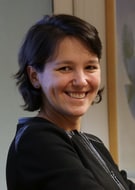
Nina Murray
Author, Poet
Nina Murray was born and raised in the Western Ukrainian city of Lviv. She holds advanced degrees in linguistics and creative writing. She is the author of the poetry collection Alcestis in the Underworld (Circling Rivers Press, 2019), as well as chapbooks, Minimize Considered (Finishing Line Press, 2018), Minor Heresies (Heartland Review Press, 2020), and Damascus Electric (Pen & Anvil Press, 2020). Her translations from Russian and Ukrainian include Peter Aleshkovsky’s Stargorod, Oksana Zabuzhko’s Museum of Abandoned Secrets, and Oksana Lutsyshyna’s Ivan and Phoebe (forthcoming from Deep Vellum). Her previous member spotlight can be found here.
As a young person, I dreamed of being a literary translator — it just seemed like the most glamorous job on the planet. When I moved to the United States from Ukraine, in 2003, I started a graduate program in Creative Writing, and while I was writing my own poetry, I also looked for opportunities to translate and to write critically about Ukrainian literature. These interests led me eventually to the ASEEES community and my first ASEEES (AAASS then) convention in Boston in 2004. I have been engaged in thinking, writing, and translating from and about the region ever since.
I write poetry, as well as book reviews, including for Slavic and East European Journal, and take opportunities to translate. This year, I was deeply honored to have Oksana Zabuzhko’s collection of short stories Your Ad Could Go Here, which I edited and helped translate. It was selected as the Best Translation of the Year by the American Association for Ukrainian Studies. I am in the middle of translating Oksana Lutsyshyna’s novel, Ivan and Phoebe, to be published by Deep Vellum next year.
As I am, at the moment, on sabbatical from the State Department, my days are given over to translating and writing poetry. Reading poetry. Reviewing poetry. Sometimes talking on YouTube about poetry. I do love to spend time with horses, so I continue to ride. And when I need a visual task for a change, I do a mean cross-stitch.
In the months leading to the February 24 Russian invasion, I was working on several exciting translation projects. I had gone to Almaty to teach at a writers’ workshop and launched a volunteer-run English language review of literature from Kazakhstan, The Alma Review. I watched my friends in Kazakhstan grapple with many of the same colonial legacies as Ukrainians have had to work through and began planning for a Ukrainian-Kazakhstan writers’ exchange in the summer-fall of 2021.
The full-scale invasion shelved these plans and violently re-oriented the lives of many friends, family members, and colleagues.
Professionally, I was struck, painfully and immediately, by the casting of women as victims. I wrote at the time, as I searched in vain for female experts on various broadcasts:
“War has a very specific place for women: right before ‘and children,’ following the number of civilian casualties. This place is on TV: the outrage that confronts a Prime Minister, the tears that cannot be fought back, the unraveling, lachrymose femininity.
Rejecting it felt like treason.
On radio and TV, Ukrainians spoke accented English and struggled with subject-verb agreements. They were cast as desperate dispossessed others, who deserve sympathy and charity. Not as fellow citizens. Or equal human beings capable of nuance, analysis, expertise. Aspiration.“
Our profession that is dominated by women seems to have failed to put forward, outside of the EU bureaucracy, female presidential advisors, defense analysts, or ambassadors. The message to me, as a woman, was clear: you belong among the globally irrelevant. Act locally.
I joined a PEN US working group that has been assisting writers, scholars, and cultural workers as well as advocating for institutional support in the US since the first days of the invasion. Many of the participants in the group were still working on assisting individuals fleeing Afghanistan. Most are women. Most of the translators who volunteer their time to translate eye-witness testimony are women.
The U.S. and allied intelligence on Putin’s regime’s preparation and execution of this invasion was spot-on, publicized for months, and yet balanced against the seemingly ineradicable accommodation of the Russian regime’s claims.
I could not put it better than my very good friend Dr. Olesya Khromeychuk, writing in “Where is Ukraine?“:
“The question we need to ask ourselves in the curatorial rooms of galleries and museums, in academia, in think tanks, on political advisory boards, is why, until Ukraine was attacked, had we not thought of securing mandatory in-house expertise on the largest country in Europe? <…>
Knowledge is not only about power; it is also a matter of security. The mental maps our students form in their classrooms will be carried with them into galleries, newsrooms, boardrooms, parliaments, military barracks and, of course, back into classrooms by the next generation of educators. If Ukraine does not exist on these mental maps, its existence on the actual map of the world will continue to be at risk.“
The work of redrawing the mental maps of our students and communities, including ASEEES, has only just begun and must never be neglected.